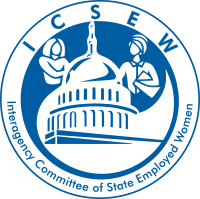Celebrating Native American Women
Janet McCloud and Ramona Bennett: Two Influential Native Women of the Northwest
By Michelle Stillings, DSHS, ICSEW Communications Subcommittee Member
Fifty years ago, on February 12, 1974, U.S. District Judge Boldt issued a ruling that Native Americans were entitled to half the salmon and steelhead catch in Washington because of the Medicine Creek Treaty of 1854. The Boldt Decision (United States v. Washington) is considered one of the most important civil rights cases of the 20th century.
Women’s History Month of this 50th anniversary is the perfect time to honor two northwest Native women, Janet McCloud and Ramona Bennett, who were vital planners and participants in the “fishing wars” that led to the Boldt Decision.
The two women leave a lasting legacy of stronger Indigenous rights, youth and women’s advocacy, and reawakened Native spiritual traditions.
Janet McCloud, Yet-Si-Blue, the Woman who Talks
Janet McCloud was born on the Tulalip Reservation in 1934, and is descended from the family of Suquamish and Duwamish Chief Sealth Si’ahl, the namesake for the city of Seattle. She was known as Yet-Si-Blue or “the woman who talks”. Her uncle, Henry Pete, said she received the name because she “had become a spokeswoman for Native culture” locally, nationally, and internationally.
After marrying a Nisqually tribal fisherman and electrical lineman named Don McCloud, Janet helped to organize and document the fishing war protests of the 1960s and 70s that eventually led to the Boldt decision.
She spent decades spreading the message of human rights and renewed Native spirituality. Janet traveled widely and spoke on Indigenous women’s rights and social justice, and founded the Northwest Indian Women’s Circle to assist women in developing leadership skills. The Circle also addressed issues with foster care placement and the adoption of Native children. Janet later became a professional teacher at the Nisqually branch of the Northwest Indian College.
She co-founded Women of All Red Nations (WARN) in 1974 and in August 1985 hosted the first meeting of the Indigenous Women’s Network in her backyard in Yelm. As a delegate to a national conference on corrections, Janet urged prisons to adopt spiritual traditions, such as sweat lodges, for Native inmates.
Sapa Dawn Center
Janet established her home in Yelm as a retreat in 1989. She named it the Sapa Dawn Center (Sapa meaning “grandfather”) to honor her husband, Don. It was a spiritual place and center for teaching Native traditions and self-sufficiency through gardening, food preservation, arts, and crafts.
As Janet said, “When all is going crazy . . . our people can come back to the center to find the calming effect, to reconnect with their spiritual self.”
In August 1985, 300 Indigenous women gathered at Sapa Dawn to discuss social and economic issues faced by Native families across the Americas. This led to the formation of the Indigenous Women’s Network, and Janet was adopted as a founding mother. She died in November 2003.
Ramona Bennett, Chairwoman and Elder, Puyallup Tribe
Ramona descended maternally from the Swinomish and Yakima Tribes. As a longtime leader of the Puyallup Tribe, she has dedicated her life to advocating for the rights of Indigenous peoples.
She earned a Bachelor’s degree from the Evergreen State college and a Master’s in education from the University of Puget Sound. She worked at the Seattle Indian Center in the early 1960s and was involved in the American Indian Woman’s Service League.
Ramona sought to address poor housing, education, health care and other issues on the Puyallup reservation and was elected to the Tribal council in 1968. She became Puyallup Tribal chairwoman in 1971 and served for seven years, but was denied entry to the National Tribal Chairmen’s Conference because she was a woman. She had to fight her way into the room the first year she attended, thus opening doors for other Native women.
In the 1970s Ramona worked as an administrator of the Wa-He-Lut school in Olympia and co-authored the 1978 Indian Child Welfare Act. In the 1980s she co-founded Rainbow Youth and Family Services in Tacoma.
Ramona was awarded the Enduring Spirit recognition by the American Native Women’s Leadership Development Forum in 2003.
The Fishing Wars
In the 1850s the Washington Territory’s first governor signed treaties with 20 Indigenous Nations to cede millions of acres of land for “the right of taking fish, at all usual and accustomed grounds and stations” including waters off of designated reservations.
Over the next century, the number of people in Washington grew geometrically and the number of salmon and steelhead declined drastically. Washington state increasingly imposed regulations and fishing fees on Natives to conserve fish for the commercial and sports fishing industries.
Federal treaties were not enforced.
During the 1960s and 70s, Natives of the northwest held civil disobedience protests called “fish-ins” to pressure local, state, and federal governments into recognizing rights granted under the treaties. The Natives repeatedly fished with traditional nets that Washington state considered illegal, and were arrested and re-arrested again and again. Native boats, motors, nets, gear, and any fish caught were confiscated, and Natives were sometimes beaten and jailed.
Janet helped to organize and document the Native side of the fishing war protests of the 1960s and 70s as the editor of Survivor News, which was printed on an old mimeograph found at a thrift store. The newsletters were collated and distributed with the help of her children.
Ramona was an early leader of the Native fishing rights movement and a planner/participant in many types of dangerous protests, which included being shot at by vigilantes while seven months pregnant.
The two women co-founded the Survival of American Indians Association in 1964 to raise bail funds and gain attention for the protests. Hollywood celebrities and civil rights activists later converged on Washington state and helped to draw attention to the cause.
Violent Confrontation
On September 9, 1970, a violent confrontation took place between Puyallup tribal fishermen and the state Department of Game wardens. Native fishermen fired warning shots from their boats on the Puyallup River and one threw a firebomb at a bridge, which later became known as the “Memorial Fishing Wars Bridge” or yabuk’wali, which means “place of a fight”.
State Game wardens and other law enforcement officials raided the Native boats and camps and broke up the demonstration with tear gas and clubs. More than 60 Natives and their supporters were arrested. The public took note of the violent law enforcement response and Stan Pitkin, then U.S. Attorney for the Western District of Washington, sued the state for not enforcing Indigenous fishing rights. He had gone to the fish-in to observe and was tear-gassed along with the Natives.
This resulted in the landmark Boldt Decision, which affirmed Native fishing rights in Washington, recognized the sovereignty of Indigenous Nations, and ordered legal enforcement by federal law assets and the Coast Guard. The U.S. Supreme Court affirmed the Boldt Decision in July 1979.
+++++
Note that the Boldt Decision at 50 exhibit will be at the Washington State History Museum in Tacoma through mid-September 2024.

